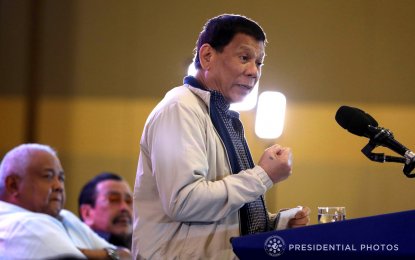
MANILA — A member of the Consultative Committee (ConCom) tasked to review the 1987 Constitution on Wednesday said President Rodrigo R. Duterte has no instructions and did not insinuate what provisions they would recommend to amend the Charter that would pave the way for a federal form of government.
ConCom subcommittee on political reform chairman Julio Cabral Teehankee made this reaction when asked about the possible impact of self-executing provisions against political dynasties on Duterte and his daughter Inday Sara who is an incumbent Davao City mayor.
“To be fair, he (Duterte) did not direct us towards any position but rather the only time we talked to him was after we took our oath of office. He told us to do what is necessary,” Teehankee said in a media interview.
After four days of grueling deliberations, ConCom members voted to prohibit second-degree relatives from succeeding each other in office and limiting the number of positions they can hold to only two – one national and one regional or local, under the federal system of government.
Teehankee said the case of Duterte and her daughter is not common in a country where there are 295 political clans.
He admitted that the Duterte family was part of the deliberations but “we are just following the instruction of the President.”
“We are prospective, not retrospective or we are looking at current political realities. We are trying to exhaust, because Constitution is not only for today but for the future. It should be flexible enough to cover the future scenario as well,” Teehankee said.
“Our immediate objective is to address the current political clans and dynasties in which we have simultaneous holding and running for elected positions of the so-called fat dynasties which refer to political families holding multiple positions,” he added.
During Wednesday’s en banc session where ConCom unanimously approved the proposed anti-dynasty provisions, committee member Rueben Canoy said the “regulated” prohibition would affect Duterte.
“It is ironic that the person who created this committee will be the first victim of our provision,” Canoy said in explaining his affirmative vote.
Duterte has repeatedly said that he would step down once the proposed federal form of government is passed into law.
With all 18 of the members present, ConCom voted to adopt five self-executing provisions that may eliminate political dynasties off the face of Philippine politics.
In the proposed provisions, the ConCom defined political dynasty as the one that “exists when a family—whose members are related up to the second degree of consanguinity or affinity, whether such relations are legitimate, illegitimate, half or full blood—maintains or is capable of maintaining political control by succession or by simultaneously running for or holding elective positions.”
Under such definition, the ConCon then adopted two more provisions: one barring any second-degree relative of an incumbent official from running “for the same position in the immediately following election” and another prohibiting second-degree relatives “from running simultaneously for more than one national and one regional or local position.”
The ban on succession means that an incumbent official’s spouse, children and children-in-law, brother and sisters and brothers- and sisters-in-law, parents and parents-in-law, and grandparents-in-law may no longer run to fill the post to be vacated by their relatives.
Under the prohibition on multiple positions, no two members of any dynasty as defined under the provisions may hold any two regional or local positions at the same time.
The committee also added a provision that empowers the future Congress to provide additional prohibitions.